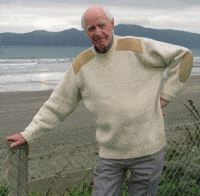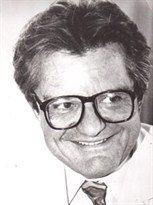OBITUARIES. 2011-2018
Y King Liu 1924 -2017
It has come to our knowledge that King Liu, a Charter member of ISSLS and a Senior Member, passed away while visiting a friend in Europe soon after the ISSLS annual meeting which he attended in Athens Greece in 2017. He lived in Petaluma, CA. Prof. Y King Liu, fondly nicknamed as “King”, was born in mainland China and spent a few years of his childhood in Calcutta, India. From there, his family migrated to US and settled in California
Henry (Harry) Vernon CrockAO MD MS FRCS FRACS FRCS Ed(Hon) D. Sc (Honoris causa) Melb
1929-2018
Henry (Harry) Crock, who died on April 21stat the age of 88, was one of Australia’s pioneer spinal surgeons with a worldwide reputation for innovative surgical techniques and a gift for teaching and mentoring young surgeons. Having trained in orthopaedics, he specialised as a spinal surgeon, researcher, anatomist and lecturer. He was Senior Orthopaedic Surgeon at St. Vincent’s Hospital, Melbourne from 1961 – 1986 and then practised in London until his retirement in 2000.
In 1974 he was a Foundation Executive Member of the International Society for the Study of the Lumbar Spine (I.S.S.L.S) and its President in 1984-5.
(Portrait painted by Paul Fitzgerald)
Gordon Waddell CBE, D.Sc. MD FRCS: 1942 – 2017
Born 21 September 1942. Died 20 April 2017
Gordon Waddell, member of the ISSLS and the orthopaedic surgeon and back pain pioneer who played a seminal role in the biopsychosocial approach to understanding and managing back pain has died, age 74. Gordon was an first-rate scientist and communicator, with an uncanny ability to synthesise complex information and present it in a way that changed how people did things. His impact has been worldwide.
Professor Barrie Vernon-Roberts, AO, MD, BSc, PhD, FRCPath, FRCPA, FAOrthA (Hon), FRS.SA
Barrie Vernon-Roberts, one of ISSLS most distinguished scientists, passed away on December 1, 2015 after a prolonged battle with Parkinson’s disease.
Barrie was born in Ruthin, Wales and studied medicine in London where he went on to complete his training in pathology (in 1974, the year ISSLS was founded). Originally he had considered orthopaedic surgery as a career and this was reflected by his lifelong involvement in the pathology of orthopaedic disease particularly that of the spine. From
the outset his opinion was highly regarded by many founding members of ISSLS including Alf Nachemson and Malcolm Jayson.
Dr. William J. Kane 1933-2015
William J. Kane one of the founders of the International Society for the Study of the Lumbar Spine died peacefully on March 27, 2015 at age 82.
After completing Medical School at Columbia University in New York he moved to Minneapolis and the University of Minnesota where he completed his Residency and stayed until 1970. During that period he was strongly influenced by Dr. John Moe and was active in spinal deformity and other areas of spine surgery. In 1970 he became Chairman of the Department of Orthopedic Surgery at Northwestern University in
Chicago where he stayed initially as Chair and then as Attending until 1988 when he moved back to Minneapolis retiring from medicine in 2009. Dr. Kane had many leadership positions including in the American Academy of Orthopaedic Surgeons, the Scoliosis Research Society, ISSLS and the Continental Orthopaedic Society. His contributions to our field were numerous and important. We have lost a great mentor and friend. (by Gunnar Andersson) Dr William Kane’s CV
Dr Duncan Troup 1924-2013
JDG Troup PhD, DSc Med), MRCS, LRCP, Hon FFOM, FErgS
Born 23 November 1924; died 20 December 2013
Duncan Troup was a remarkable man. As one of the founding group for our society, Duncan’s substantial and far reaching contribution to spinal medicine set the scene for much of the current research. After studying medicine in London, Duncan decided against general practice, training instead as an osteopath. Seeking other ways, not just the orthodox way, became a defining characteristic – Duncan dared to be different.
Returning to medicine in the early 1970s, he ran the newly formed Spinal Research Unit at the Royal Free Hospital School of Medicine in London. Initially he focused on studies to improve diagnostic accuracy in spinal medicine, with forays into bioengineering and electromyography, before being asked by the Department of Health to run a clinical trial into the effectiveness of physiotherapy for sciatica. Following a visit to the USA, which kindled his interests in ergonomics, biomechanics, epidemiology, and occupational medicine, he moved to the University of Liverpool, and later was a visiting professor at the Finnish Institute of Occupational Health in Helsinki.
Duncan’s research was conceptually highly innovative, gaining great international respect. He was a familiar figure at spine conferences with his challenging questions and kindly support being given in equal amounts. His work with various colleagues gained the Volvo Award in Clinical Sciences in 1987 (prospective epidemiological study in industry), and again in 1990 (back pain and spinal pathology related to spinal loading). Not content with physical sciences, Duncan was involved in the early investigation fear-avoidance behaviour that would feed into the dominance of biopsychosocial approach. But, as Duncan was to continually remind us, we forget the bio at our peril!
Duncan really was a pioneer who recognised the vital importance of bringing the power of multiple disciplines together if we are to understanding spinal problems and devise better ways to manage them, both in the clinic and the workplace.
Duncan was an extraordinary man, one who was generous with his time, his intellect and his friendship. He was innovative in his thinking, and encouraged us to contemplate what it is we do, why we do it, and how we might do it better. He will be remembered for his humour and his sense of mischief as well as his uncompromising approach to scientific endeavour. Duncan leaves a wonderful legacy with persisting ramifications that transcend disciplinary divides. The photograph is from his retirement in Scotland: doubtless still pondering some thorny problem.
(by Kim Burton, Paul Brinckmann, Gunnar Andersson, Tapio Videman)
Dr Robin McKenzie 1931-2013
We regret to inform you that one of our Senior members, Robin McKenzie, passed away on May 13, 2013 at his home in New Zealand. Robin was an icon in the field of physical therapy, particularly as it relates to low back pain. He developed the McKenzie Method of Mechanical Diagnosis and Therapy for low back pain patients. He was also the founder of the McKenzie Institute. ISSLS extends our deepest condolences to his many friends and family.
Harry Herkowitz 1948-2013
It is with a heavy heart that we inform you of the death of Harry Herkowitz, MD, Past President of the Society. An icon in the field of orthopaedic and spinal surgery, Dr. Herkowitz was a Professor and the Chairman of Orthopaedic Surgery at the Oakland University William Beaumont School of Medicine. A devoted family man, Dr. Herkowitz also trained a generation of spine surgeons to carry on his legacy of research, teaching, and dedication to improving the lives of patients. ISSLS extends our deepest condolences to his many friends and family.
(by Steven Garfin and Jeffrey Fischgrund)
Robert Maigne 1923-2012
Dr Robert Maigne passed away at the age of 89 on July 4, 2012. If his name is survived by the “Maigne syndrome” (pain referred from the thoracolumbar junction), his work is well beyond.
He was a rheumatologist. He developed a special interest in manual and orthopaedic medicine. He described the segmental examination of the spine, codified the indications of manual treatment and described different painful syndromes: painful minor intervertebral dysfunction, low back pain originating from the thoracolumbar junction,
headache and upper thoracic pain from the cervical spine, costal sprains, dorsal rami, etc. He introduced manual medicine at the university and organized a “university diploma of manual medicine” still continuing. He had hundreds of students, all MDs, attending his department at the Hotel-Dieu hospital in Paris, where he worked for 25 years.
He was a member of the ISSLS. The world of manual medicine will miss him deeply.
Jürgen Krämer 1939-2011
It is with deep regret that we inform you of the passing of one of our Past Presidents, Professor Dr. Jürgen Krämer, on October 7, 2011. Professor Krämer was an acknowledged expert in the international lumbar spine community, a leading clinician and researcher in his home country of Germany, and a leader within ISSLS and other scientific societies.
His research activities spanned a wide rang throughout his distinguished career including biomechanics and pathoanatomy, the diagnosis and treatment of lumbar spin disorders, and pain management.ISSLS extends our deepest condolences to his family.
Donald Harrison 1946-2011
It is with regret that we inform you of the passing of Dr. Donald Harrison on July 20, 2011 at the age of 65 years. Dr. Harrison was an important member of ISSLS along with his son Deed in bringing the perspective of chiropractors together with mathematics and engineering to their research in lumbar spine disorders. ISSLS extends our condolences to his family.











